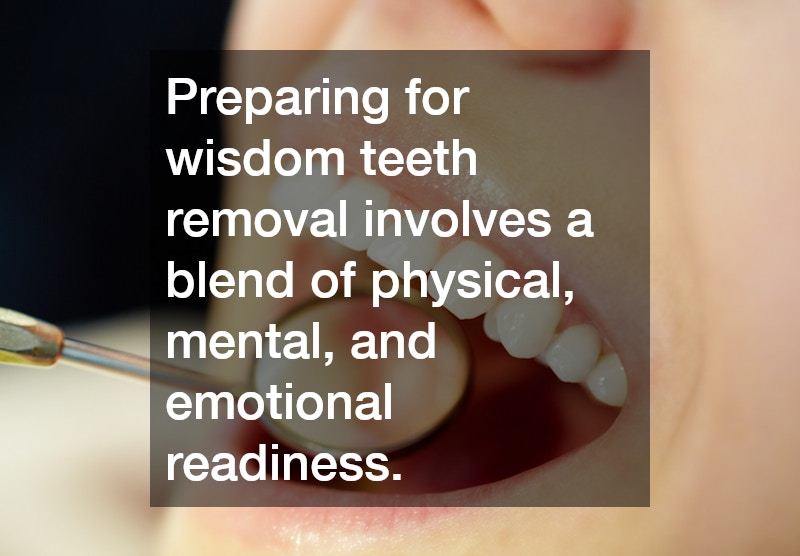Undergoing wisdom teeth removal can be a nerve-racking experience for many people. This common dental surgery is something most people encounter in their late teens or early twenties. Preparing effectively for this procedure can greatly enhance recovery and minimize discomfort.
By understanding the purpose of wisdom teeth removal and planning ahead, patients can ensure a smoother experience. This article will explore simple, effective ways to prepare for your wisdom teeth removal.
Understanding the Procedure
Before preparing for wisdom teeth removal, it is crucial to understand why the procedure is necessary. Wisdom teeth, or third molars, are the last set of teeth to erupt and often do so between the ages of 17 and 25. Due to insufficient space in the mouth, these teeth can become impacted, leading to pain, infection, or damage to adjacent teeth. The potential complications necessitate their removal by a dental professional. Understanding this helps set realistic expectations and reduces anxiety about the procedure.
Additionally, recognizing the potential risks and complications associated with wisdom teeth removal is vital. While complications are rare, they may include dry socket, infection, damage to nearby teeth, or prolonged bleeding. Your dentist or oral surgeon will discuss these risks and provide instructions to mitigate them. It’s important to follow all pre-operative guidelines to minimize the risk of complications. Having this knowledge ensures that you’re well-prepared and ready to ask pertinent questions when consulting with your oral healthcare provider.
Preparing Physically
The days leading up to your wisdom teeth removal procedure can greatly influence your recovery. Start by arranging your schedule to accommodate the necessary recovery time post-surgery, which typically lasts a few days. It’s sensible to prepare a comfortable recovery space at home, equipped with all the essentials such as ice packs, soft pillows, and cozy blankets. Ensuring that your recovery environment is comfortable can greatly reduce stress and inconvenience once you return from the procedure. A well-prepared rest area can enhance healing by promoting relaxation and reducing strain on your body.
Another essential step in physical preparation is to adhere strictly to any instructions given by your dentist or surgeon. This may include fasting guidelines, a list of medications to avoid, and instructions on oral hygiene practices pre-surgery. Fasting is often required when general anesthesia will be used, as it reduces the risk of complications during the procedure. Failure to follow these instructions can lead to delays or even cancellation of the surgery. By carefully following these pre-operative instructions, you can ensure optimal conditions for a successful surgery.
Managing Anxiety and Expectations
It’s natural to feel anxious about undergoing wisdom teeth removal, but managing this anxiety is crucial for a successful experience. Consider scheduling a pre-surgery consultation with your oral surgeon to discuss any concerns you may have. Asking questions and gaining a thorough understanding of the process can help alleviate fears. Some patients find it helpful to engage in relaxation techniques such as deep breathing, meditation, or light exercise to calm their nerves before the surgery. Effective anxiety management can create a more positive surgical experience and facilitate recovery.
Additionally, it’s helpful to arrange for emotional support from friends or family members both before and after the procedure. They can provide reassurance, drive you to and from the surgery, and help care for you in the immediate postoperative period. Having someone there to assist with meals, medication management, and household tasks can significantly lower stress levels. Emotional preparation is just as crucial as physical preparation, and a supportive environment can be tremendously comforting and beneficial.
Post-Operation Care
After wisdom teeth removal, adhering to your dentist or surgeon’s post-operative instructions is essential in ensuring a smooth recovery. Pain management is often the first priority; utilizing prescribed pain medications as directed will make recovery more comfortable. Applying an ice pack to the face at intervals during the first 24 hours post-surgery can minimize swelling. Maintaining a soft food diet is also critical to prevent irritating the surgical sites. Proper pain and swelling management will facilitate healing and prevent complications such as dry socket or infection.
Keeping the surgical area clean is another critical aspect of recovery. Rinsing gently with warm saltwater a few times a day can aid in cleaning the site and preventing infections. Brushing should be done carefully, avoiding the surgical areas to prevent irritation or damage. Getting adequate rest is also vital as it allows the body to focus its energy on healing. Proper hygiene and rest significantly improve the outcome of the healing process.
Follow-up appointments with your dentist or surgeon are crucial in the monitoring of your recovery. These appointments are opportunities for the healthcare provider to assess healing progress and address any concerns or complications that may arise. Compliance with scheduled follow-up visits ensures that any issues are identified and addressed promptly. Your dentist can offer additional guidance tailored to your specific recovery needs. Regular follow-up enhances the effectiveness of the recovery process, ensuring a return to normal activities as quickly and safely as possible.
Preparing for wisdom teeth removal involves a blend of physical, mental, and emotional readiness. Understanding the procedure, crafting a conducive recovery environment, and managing expectations can significantly improve the surgical experience. Equipping yourself with knowledge and support helps in efficiently navigating the hurdles of pre- and post-operative care. By following these simple preparation steps, patients can ensure a smoother and more pleasant recovery process. Remember, thorough preparation is key to a positive outcome and swift return to health after wisdom teeth removal.



